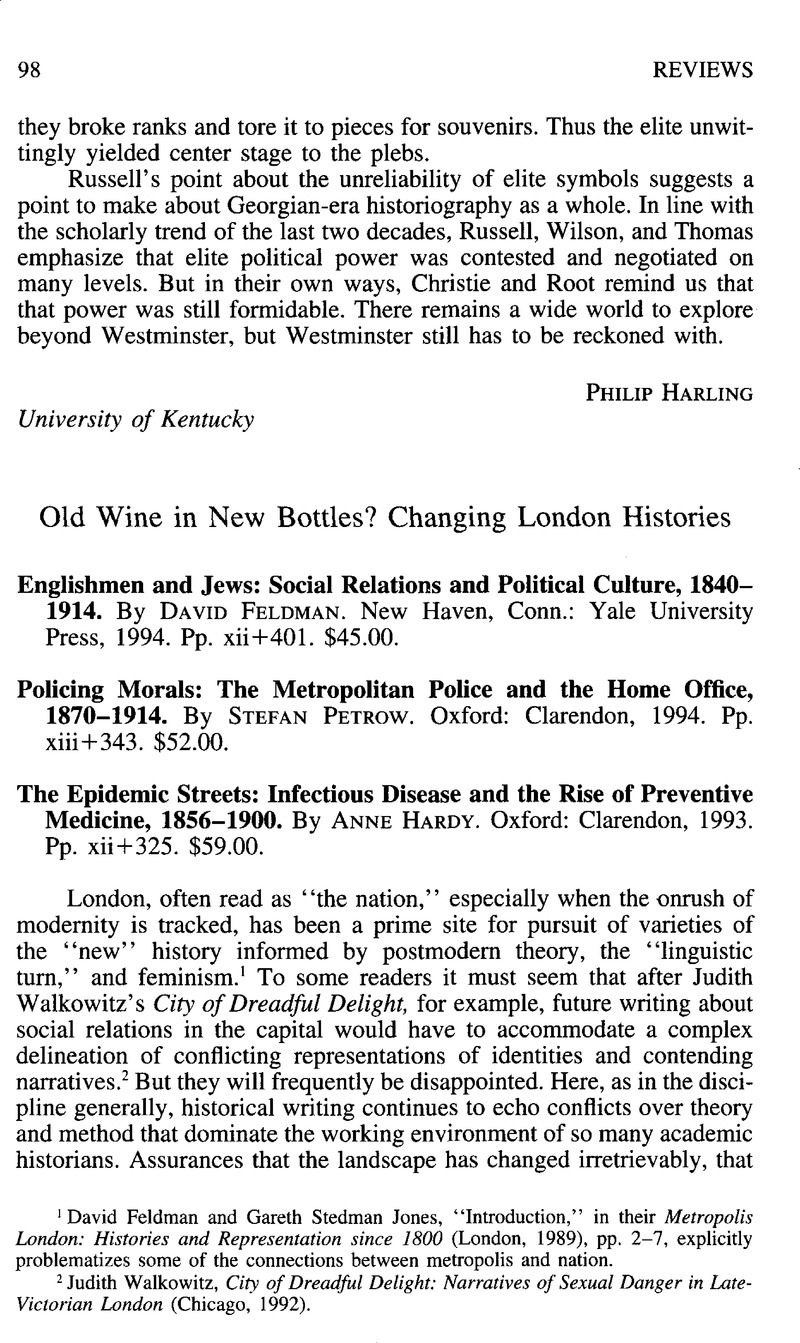No CrossRef data available.
Article contents
Old Wine in New Bottles? Changing London Histories - Englishmen and Jews: Social Relations and Political Culture, 1840–1914. By David Feldman. New Haven, Conn.: Yale University Press, 1994. Pp. xii + 401. $45.00. - Policing Morals: The Metropolitan Police and the Home Office, 1870–1914. By Stefan Petrow. Oxford: Clarendon, 1994. Pp. xiii + 343. $52.00. - The Epidemic Streets: Infectious Disease and the Rise of Preventive Medicine, 1856–1900. By Anne Hardy. Oxford: Clarendon, 1993. Pp. xii + 325. $59.00.
Published online by Cambridge University Press: 10 January 2014
Abstract

- Type
- Reviews
- Information
- Copyright
- Copyright © North American Conference of British Studies 1998
References
1 Feldman, David and Jones, Gareth Stedman, “Introduction,” in their Metropolis London: Histories and Representation since 1800 (London, 1989), pp. 2–7Google Scholar, explicitly problematizes some of the connections between metropolis and nation.
2 Walkowitz, Judith, City of Dreadful Delight: Narratives of Sexual Danger in Late-Victorian London (Chicago, 1992)CrossRefGoogle Scholar.
3 This reflects contending theoretical positions debated in the pages of professional journals as well as institutional conflict. See, e.g., in the United States, Hamerow, T. S., Himmelfarb, G., Levine, L. W., Scott, J. W., and Toews, J. E., “AHR Forum: The Old History and the New,” American Historical Review 94, no. 3 (1989): 654–98CrossRefGoogle Scholar; in the United Kingdom, Joyce, Patrick, “The End of Social History?” Social History 20, no. 1 (1995): 73–91CrossRefGoogle Scholar; and Eley, Geoff and Nield, Keith, “Starting Over: The Present, the Post-Modern and the Moment of Social History,” Social History 20, no. 3 (1995): 355–64CrossRefGoogle Scholar. Eley and Nield complain of the peremptory “tonality” in much of the polemics, which must be familiar to countless historians who have experienced similar disputation in their own history departments. For a distancing of feminist historical practice from the post-modern, see Okin, Susan Moller, “Gender and Relativism in Recent Feminist Historical Scholarship,” New Zealand Journal of History 29, no. 2 (1995): 211–25Google Scholar.
4 Walkowitz's demonstration in City of Dreadful Delight of the shaping of a range of conflicting political narratives and discourses, stemming from the intervention of individuals such as Georgina Weldon and W. T. Stead, provides a vivid example. At the same time Ross, Ellen, Love and Toil: Motherhood in Outcast London, 1870–1918 (New York, 1993)Google Scholar, whose work is less directly indebted to a postmodern framework, focuses on the practices of London's mothers and illustrates their role in the shaping of early twentieth-century maternalist policies. For the postmodern position, see Scott, Joan W., “The Evidence of Experience,” Critical Inquiry 17 (Summer 1991): 773–97CrossRefGoogle Scholar.
5 Pellew, J., The Home Office, 1848–1914: From Clerks to Bureaucrats (London, 1982)Google Scholar.
6 MacDonagh, Oliver, A Pattern of Government Growth, 1800–1860: The Passenger Acts and Their Enforcement (London, 1961)Google Scholar.
7 Foucault, Michel, Discipline and Punish: The Birth of the Prison (New York, 1979)Google Scholar.
8 McKeown, Thomas, The Modern Rise of Population (London, 1976)Google Scholar; see also Szreter, S., “The Importance of Social Intervention in Britain's Mortality Decline: A Reinterpretation of the Role of Public Health,” Social History of Medicine 1 (1988): 1–39CrossRefGoogle Scholar; Wohl, A. S., Endangered Lives: Public Health in Victorian Britain (London, 1983)Google Scholar.
9 For example, Lewis, Jane, The Politics of Motherhood: Child and Maternal Welfare in England, 1900–1939 (London, 1980)CrossRefGoogle Scholar; Ross, Love and Toil; Davin, Anna, “Imperialism and Motherhood,” History Workshop 5 (1978): 7–65CrossRefGoogle ScholarPubMed; Dwork, Deborah, War Is Good for Babies and Other Young Children: A History of the Infant and Child Welfare Movement in England, 1898–1918 (London, 1987)Google Scholar; Riley, Denise, War in the Nursery: Theories of the Child and Mother (London, 1983)Google Scholar.
10 For a recent example of skeptical but constructive deployment of a range of new conceptual tools to a discussion of London's urban growth, see Winter, James, London's Teeming Streets, 1830–1914 (London, 1993)Google Scholar.
11 Kuhn, Thomas, The Structure of Scientific Revolutions (Chicago, 1962), p. 148Google Scholar.
12 Disraeli, Benjamin, Lothair (1870; reprint, London, 1908), p. 115Google Scholar.




